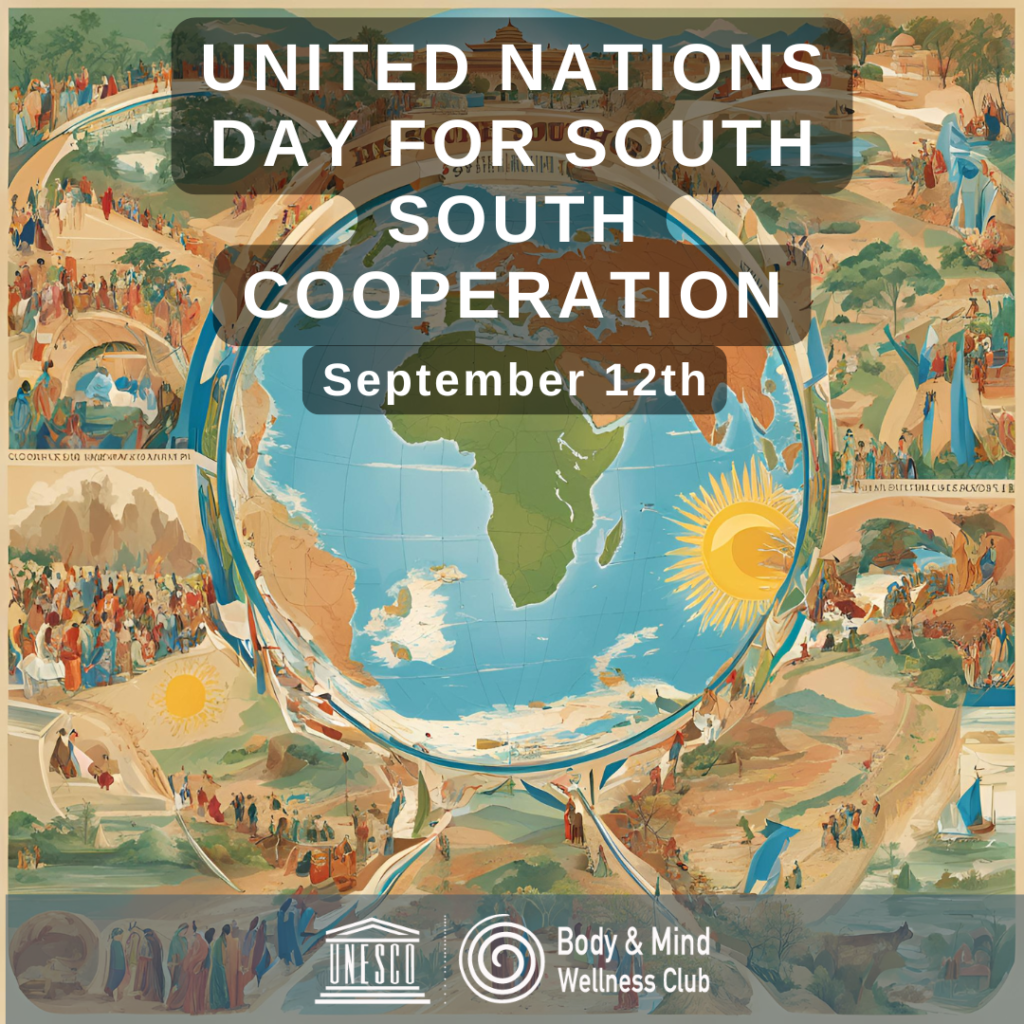
United Nations Day for South-South Cooperation, celebrated annually on September 12, serves as a vital platform to recognize and promote collaborative efforts among developing countries in the Global South (see here). This day emphasizes the importance of solidarity, equity, and partnership in achieving sustainable development goals (SDGs) and uplifting humanity through shared knowledge and resources.
The Origin
The roots of South-South cooperation can be traced back to the late 1970s, particularly with the adoption of the Buenos Aires Plan of Action for Promoting and Implementing Technical Cooperation among Developing Countries (BAPA) in 1978. This landmark agreement, signed by 138 UN member states, aimed to foster technical collaboration among developing nations facing similar challenges and historical contexts. The BAPA established a framework for cooperation that respects sovereignty, promotes non-interference, and ensures equality among nations (see here).
Over the years, South-South cooperation has evolved, reflecting the dynamic political and economic landscape of the Global South. Initially birthed in the context of Cold War politics, it has grown into a robust mechanism for countries to share expertise, technology, and best practices across various sectors, including health, agriculture, and education. The emphasis on human rights and human dignity has been central to these initiatives, ensuring that development efforts are inclusive and equitable.
Importance of the Day
Promoting Human Rights: South-South cooperation is a powerful mechanism for promoting human rights and human dignity. By sharing knowledge, resources, and expertise, developing countries can work together to address issues such as poverty, inequality, and social injustice. This collaboration helps to ensure that all people, regardless of their geographic location, have access to basic rights such as education, healthcare, and economic opportunities.
Through South-South cooperation, countries can collectively advocate for policies that protect and uplift vulnerable populations, thereby fostering a more just and equitable world. By strengthening ties among developing nations, this cooperation contributes to the realization of universal human rights and the enhancement of human dignity across the globe.
Diversion, Inclusion, and Equity: A key aspect of South-South cooperation is the promotion of diversion, inclusion, and equity. The Global South is characterized by its rich cultural diversity, and through cooperation, countries can learn from each other’s experiences and best practices. This exchange of knowledge and ideas helps to create more inclusive societies where all individuals, regardless of their background, have the opportunity to thrive.
South-South cooperation also plays a crucial role in addressing global inequities. By working together, developing countries can strengthen their collective bargaining power in international forums, ensuring that their voices are heard and their interests are represented. This fosters a more balanced and equitable global system, where all nations, regardless of their economic status, can participate in and benefit from global development.
Positivity and Inner Peace: The spirit of South-South cooperation is rooted in the principles of solidarity, mutual respect, and shared responsibility. By working together to address common challenges, countries can spread positivity and foster inner peace both within and among nations. This cooperation promotes understanding and empathy, as countries recognize their shared struggles and work together to overcome them.
By focusing on collective progress rather than competition, South-South cooperation creates a sense of unity and shared purpose. This approach not only uplifts the spirits of individuals and communities but also contributes to the overall well-being and stability of nations. In a world where conflicts and divisions are all too common, South-South cooperation offers a pathway to peace and harmony.
Uplifting Humanity Through Collective Action: South-South cooperation is a powerful tool for uplifting humanity. By pooling their resources and expertise, developing countries can achieve more together than they could individually. This collective action enables countries to tackle complex challenges such as climate change, food security, and sustainable development, which require coordinated efforts at the regional and global levels.
Through South-South cooperation, countries can implement innovative solutions that address the unique needs of their populations while also contributing to global progress. By working together, they can create a brighter future for all, where everyone has the opportunity to live with dignity, security, and hope.
Theme for 2024
The theme for the 2024 United Nations Day for South-South Cooperation, “A Better Tomorrow with South-South Cooperation,” emphasizes the forward-looking vision of this global partnership. It highlights the potential of South-South cooperation to create a more sustainable, equitable, and prosperous future for all. This theme calls on developing nations to unite in addressing pressing challenges such as poverty, inequality, and climate change, by leveraging their shared experiences and resources. By focusing on building a better tomorrow, this theme reinforces the importance of collaboration in fostering human rights, promoting human dignity, and ensuring that the benefits of development are shared by all. It is a reminder that through solidarity and mutual support, the Global South can pave the way for a brighter, more inclusive future for generations to come.
UNESCO BMW’s Involvement
We emphasize the importance of mental and emotional wellness, which is crucial for fostering inner peace and resilience among communities in the Global South. By facilitating workshops and programs that encourage knowledge exchange and collaboration, we aim to uplift humanity and spread positivity. We not only focus on individual well-being but also advocate for broader socio-economic progress, environmental sustainability, and gender equality, thereby reinforcing the significance of inclusion and equity in achieving the Sustainable Development Goals (SDGs). With the newly launched ReWIND initiative, we aim to enhance mental well-being and uplift spirits in celebration of this day.
UNESCO BMW’s Vision
Our vision mission encompasses three main goals that are also in line with this occasion today and engage people of all ages, especially the youth improvement of the inner ecosystem, enhancement of inner creativity through arts and crafts, and, lastly, encouragement of inner peace globally.
By: Vivek Raj Singh